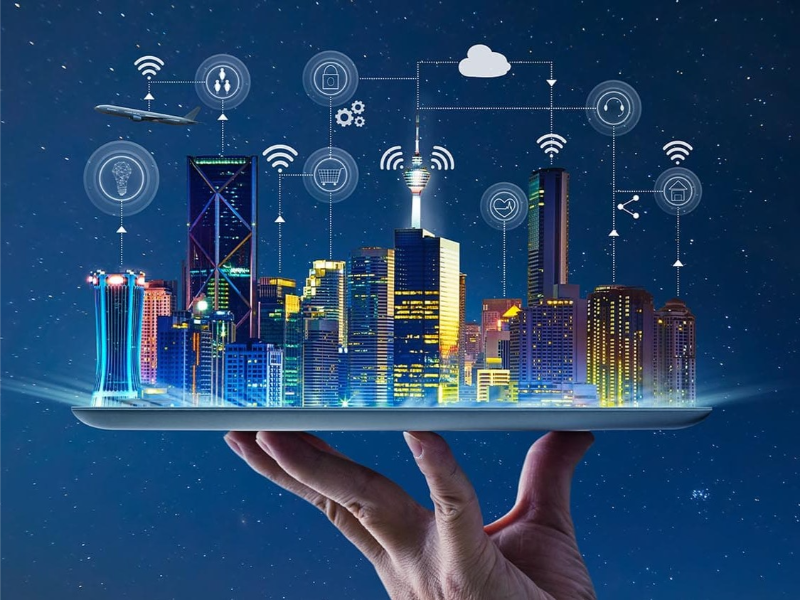- Smart cities like London and Singapore are integrating technology to enhance urban services and quality of life.
- While smart cities offer numerous benefits, they also come with some issues that need to be addressed, like privacy concerns, the digital divide, and the need for robust cybersecurity measures.
In the modern world, the concept of smart cities is becoming increasingly popular. These are urban areas that integrate various information and communication technologies (ICT) to enhance the quality of life, sustainability, and efficiency of urban services. Let’s explore some examples of smart cities around the globe and understand how they are making a difference.
London: The tech hub
London, the capital of the United Kingdom, is a prime example of a smart city. It boasts a robust digital infrastructure and is home to Tech City, a cluster of technology startups.
The city uses data analytics to manage traffic flow, reduce congestion, and improve air quality. For instance, the ‘London Datastore’ provides open data to the public, allowing for better decision-making and innovation.
Singapore: The green metropolis
Singapore is renowned for its green initiatives and is often cited as a model smart city.
The city-state has implemented a comprehensive ‘Smart Nation’ plan, which includes the use of sensors to monitor environmental conditions and manage waste efficiently. Singapore’s public transportation system is also highly integrated with technology, making it one of the most efficient in the world.
Also read: Highlights from the Intelligent Infrastructure Conference
Barcelona: The connected city
Barcelona, Spain, has been a pioneer in smart city development.
The city has deployed a network of sensors to collect data on air quality, noise levels, and traffic. This data is used to improve urban planning and services. Barcelona’s “Barcelona Smart City” initiative is a testament to its commitment to sustainability and technological innovation.
Amsterdam: The sustainable capital
Amsterdam, the capital of the Netherlands, is known for its focus on sustainability and smart city solutions.
The city has implemented smart grids to manage energy consumption and reduce carbon emissions. Amsterdam also uses technology to improve cycling infrastructure, making it one of the most bike-friendly cities in the world.
Copenhagen: The eco-friendly city
Copenhagen, Denmark, is another city that has embraced the smart city concept with a strong emphasis on environmental sustainability.
The city aims to become carbon-neutral by 2025. It has invested in renewable energy, smart waste management, and efficient public transportation systems.
Songdo: The planned smart city
Songdo, South Korea, is a unique example of a smart city because it was planned from the ground up with smart technologies in mind.
The city features state-of-the-art infrastructure, including an extensive network of sensors and a centralized control system. Songdo is designed to be highly connected, with a focus on energy efficiency and environmental sustainability.
Also read: Understanding cellular IoT: Basics, benefits, and applications
Masdar city: The renewable energy haven
Masdar City in Abu Dhabi, UAE, is a city built with sustainability at its core. It is designed to be a zero-carbon, zero-waste city, powered entirely by renewable energy. The city uses advanced technologies for energy management, water conservation, and waste recycling.
Stockholm: The innovation hub
Stockholm, Sweden, is another city that has embraced the smart city concept.
It has a strong focus on innovation and has implemented various smart solutions, including smart grids, e-health services, and intelligent transportation systems. Stockholm’s “Vision 2040” plan outlines its commitment to becoming a sustainable and smart city.
Smart city technologies
The examples of smart cities mentioned above utilize a variety of technologies to enhance urban living. These include:
- Internet of things (IoT): Sensors and devices that collect and exchange data to improve services.
- Big data analytics: The use of large data sets to identify patterns and make decisions.
- Smart grids: Energy systems that are more efficient and responsive.
- Intelligent transportation systems: Technologies that improve traffic management and reduce congestion.
- E-government services: Online platforms that make it easier for citizens to access government services.
Challenges and considerations
While smart cities offer numerous benefits, they also come with challenges. Privacy concerns, the digital divide, and the need for robust cybersecurity measures are some of the issues that need to be addressed. Additionally, the implementation of smart city technologies requires significant investment and careful planning.
Smart cities are the future of urban living. They offer a vision of a more connected, efficient, and sustainable way of life. By integrating technology into the fabric of urban environments, cities like London, Singapore, Barcelona, Amsterdam, Copenhagen, Songdo, Masdar City, and Stockholm are leading the way in creating smarter, better places to live.

